- Home
- Andrzej Sapkowski
Season of Storms Page 24
Season of Storms Read online
Page 24
“Shit, not much money,” muttered Nikefor Muus, court clerk, who was sitting in the back row, by turns nervously clenching his ink-stained fingers into a fist and pulling his fingers through his thinning hair. “I knew it wasn’t worth bothering—”
Antea Derris shut him up with a hiss.
“Count Horvath, one thousand one hundred. The gentleman with number seventeen, one thousand two hundred. The Honourable Nino Cianfanelli, one thousand five hundred. The gentleman in the mask, one thousand six hundred. The gentleman with number seventeen, one thousand seven hundred. Count Horvath, one thousand eight hundred. The gentleman in the mask, two thousand. The Honourable Master Cianfanelli, two thousand one hundred. The gentleman in the mask, two thousand two hundred. Any more bids? The Honourable Master Cianfanelli, two thousand five hundred … The gentleman with number seventeen …”
The gentleman with number seventeen was suddenly seized under the armpits by two burly thugs who had entered the room unnoticed.
“Jerosa Fuerte, known as Needle,” drawled a third thug, tapping the arrested man in the chest with a club. “A hired killer, with a warrant issued for his apprehension. You are under arrest. Take him away.”
“Three thousand!” yelled Jerosa Fuerte, known as Needle, waving the sign with the number seventeen that he was still holding. “Three … thousand …”
“I’m sorry,” said Abner de Navarette coldly. “It’s the rules. A bidder’s offer is cancelled on the event of his arrest. The current bid is two thousand five hundred, offered by the Honourable Master Cianfanelli. Do I hear a higher bid? Count Horvath, two thousand six hundred. The gentleman in the mask, two thousand seven hundred. The Honourable Master Cianfanelli, three thousand. Going once, going twice …”
“Four thousand.”
“Oh. The Honourable Molnar Giancardi. Bravo. Four thousand crowns. Do I hear four thousand five hundred?”
“I wanted them for my son,” snapped Nino Cianfanelli. “And you have only daughters, Molnar. What do you want with those swords? Ah well, have it your own way. I yield.”
“Sold,” declared de Navarette, “to the Honourable Master Molnar Giancardi for four thousand crowns. Let us go on, noble ladies and gentlemen. Lot number eleven: a cloak of monkey fur …”
Nikefor Muus, joyful and grinning like a weasel in a chicken coop, slapped Antea Derris on the back. Hard. Only the last remnants of her will prevented Antea from punching him in the mouth.
“We’re leaving,” she hissed.
“And the money?”
“After the auction is over and the formalities have been completed. That will take some time.”
Ignoring the grumbling of Nikefor Muus, Antea walked towards the door. She was aware of somebody observing her and glanced surreptitiously. A woman. With black hair. Attired in black and white. With an obsidian star hanging in her cleavage.
She felt a shiver.
Antea had been right. The formalities did take some time. They could only go to the bank two days later. It was a branch of one of the dwarven banks, smelling—like all the others—of money, wax and mahogany panelling.
“The sum to be paid is three thousand three hundred and sixty-six crowns,” declared the clerk. “After subtracting the bank’s charges of one per cent.”
“The Borsodys: fifteen, the bank: one,” growled Nikefor Muus. “They’d take a cut from everything! Daylight robbery! Hand over the cash!”
“One moment.” Antea stopped him. “First, let’s sort out our affairs, yours and mine. I’m also due a commission. Of four hundred crowns.”
“Hold on, hold on!” yelled Muus, attracting the gaze of other clerks and customers. “What four hundred? I’ve barely got three thousand and a few pennies from the Borsodys …”
“According to the contract I’m owed ten per cent of the sale price. The costs are your affair. And they apply only to you.”
“What are you—?”
Antea Derris looked at him. That was enough. There wasn’t much resemblance between Antea and her father. But Antea could glare just like he did. Just like Pyral Pratt. Muus cringed beneath her gaze.
“Please make out a cheque for four hundred crowns from the sum to be paid,” she instructed the clerk. “I know the bank takes a commission, I accept that.”
“And my dough in cash!” The court scribe pointed to the large leather satchel he was lugging. “I’ll take it home and hide it away safely! No thieving banks are going to fleece me for a commission!”
“It’s a considerable sum,” said the clerk, standing up. “Please wait here.”
As he left the counter the clerk opened the door leading to the rear for a moment, but Antea could have sworn that for a second she saw a black-haired woman dressed in black and white.
She felt a shiver.
“Thank you, Molnar,” said Yennefer. “I won’t forget this favour.”
“What are you thanking me for?” smiled Molnar Giancardi. “What have I done, what service have I rendered? That I bought a certain lot at auction? Paying for it with money from your private account? And perhaps that I turned away when you cast that spell a moment ago? I turned away, because I was watching that agent from the window as she walked away, gracefully swaying this and that. She’s a dame to my taste, I don’t deny it, although I’m not fond of human females. Will your spell … cause her problems too—?”
“No,” interrupted the sorceress. “Nothing will happen to her. She took a cheque, not gold.”
“Indeed. You will take away the Witcher’s swords at once, I presume. After all, to him they mean—”
“—everything.” Yennefer completed his sentence. “He’s bound to them by destiny. I know, I know, indeed. He told me. And I’ve begun to believe it. No, Molnar, I won’t take the swords today. They can remain in the safe deposit. I’ll soon send an authorised person to collect them. I leave Novigrad this very day.”
“As do I. I’m riding to Tretogor, I have to inspect the branch there. Then I’m going home to Gors Velen.”
“Well, thank you once again. Farewell, O dwarf.”
“Farewell, O sorceress.”
INTERLUDE
Precisely one hundred hours after the gold was taken from the Giancardis’ bank in Novigrad
“You’re banned from entry,” said the doorman Tarp. “And well aware of that. Move away from the steps.”
“Ever seen this, peasant?” Nikefor Muus shook and jingled a fat pouch. “Ever seen so much gold at one time? Out of my way, a nobleman is coming through! A wealthy lord! Stand aside, churl!”
“Let him in, Tarp.” Febus Ravenga emerged from inside the osteria. “I don’t want any disturbance here; the customers are growing anxious. And you, beware. You’ve cheated me once, there won’t be a second time. You’d better have the means to pay this time, Muus.”
“Mr. Muus!” The scribe shoved Tarp aside. “Mr.! Beware how you address me, innkeeper!
“Wine,” he cried, lounging back in a chair. “The dearest you have!”
“Our dearest costs sixty crowns …” the maître d’hôtel stated gravely.
“I can afford it! Give me a whole jug and pronto!”
“Be quiet,” Ravenga admonished him. “Be quiet, Muus.”
“Don’t silence me, mountebank! Trickster! Upstart! Who are you to silence me? A gilded sign, but with muck still on your boots. And shit will always be shit! Take a look here! Ever seen so much gold at one time? Well?”
Nikefor Muus reached into the pouch, pulled out a handful of gold coins and tossed them contemptuously on the table.
The coins landed with a splash, melting into a brown gunk. A ghastly stench of excrement spread around.
The customers of the Natura Rerum osteria leaped to their feet and dashed for the exit, choking and covering their noses with napkins. The maître d’hôtel bent over and retched. There was a scream and a curse. Febus Ravenga didn’t even twitch. He stood like a statue, arms crossed on his chest.
Muus, dumbfounded, shook his he
ad, goggled and rubbed his eyes, staring at the stinking pile of shit on the tablecloth. He finally roused himself and reached into the pouch. And pulled out a handful of soft gunk.
“You’re right, Muus,” said Febus Ravenga in an icy voice. “Shit will always be shit. Into the courtyard with him.”
The court scribe didn’t even put up any resistance as he was hauled away, too bewildered by what had happened. Tarp dragged him to the outhouse. At a sign from Ravenga, two servants removed the wooden cover of the latrine. Muus became animated at the sight and began to yell, struggle and kick. It didn’t help much. Tarp hauled him to the earth closet and threw him down the opening. The young man tumbled into the sloppy excrement. But he didn’t go under. He spread out his arms and legs and held his head up, keeping himself on the surface of the muck with his arms on bunches of straw, rags, sticks and crumpled pages from various learned and pious books.
Febus Ravenga took down from the wall of the granary a wooden pitchfork made from a single forked branch.
“Shit was, is and will remain shit,” he said. “And always ends up where shit is.”
He pressed down on the pitchfork and submerged Muus. Completely. Muus broke the surface, roaring, coughing and spitting. Ravenga let him cough a little and get his breath back and then submerged him again. This time much deeper.
After repeating the operation several times, he threw down the pitchfork.
“Leave him,” he ordered. “Let him crawl out by himself.”
“That won’t be easy,” adjudged Tarp. “And it’ll take some time.”
“Let it. There’s no rush.”
A mon retour (hé! je m’en désespere!)
Tu m’as reçu d’un baiser tout glacé.
Pierre de Ronsard
CHAPTER SIXTEEN
Just at that moment, the Novigradian schooner Pandora Parvi, a beautiful ship indeed, was sailing to its mooring place under full sail. Beautiful and swift, thought Geralt, descending the gangway onto the busy wharf. He had seen the schooner in Novigrad, asked around and knew it had set sail from there two whole days after the galley Stinta, on which he had sailed. In spite of that, he had essentially reached Kerack at the same time. Perhaps I ought to have waited and boarded the schooner, he thought. Two days more in Novigrad. Who knows, perhaps I would have acquired some more information?
Vain digressions, he decided. Perhaps, who knows, maybe. What has happened has happened, nothing can change it now. And there’s no sense going on about it.
With a glance, he bade farewell to the schooner, the lighthouse, the sea and the horizon, darkening with storm clouds. Then he set off for the town at a brisk pace.
Just at that moment, two porters were coming out carrying a sedan chair, a dainty construction with delicate lilac curtains. It had to be Tuesday, Wednesday or Thursday. On those days Lytta Neyd saw patients: usually wealthy, upper-class ladies, who arrived in sedan chairs like that.
The doorman let him in without a word. Just as well. Geralt wasn’t in the best of moods and would certainly have retaliated with a word. Or even two or three.
The patio was deserted and the water in the fountain burbled softly. There was a carafe and some cups on a small malachite table. Without further ado, Geralt poured himself a cup.
When he raised his head, he saw Mozaïk. In a white coat and apron. Pale. With her hair slicked down.
“It’s you,” she said. “You’re back.”
“It certainly is,” he confirmed dryly. “I most certainly am. And this wine is most certainly a little sour.”
“Such a pleasure seeing you again.”
“Coral? Is she here? And if so, where?”
“I saw her between the thighs of a patient a moment ago,” she shrugged. “She’s most certainly still there.”
“You indeed have no choice, Mozaïk,” he responded calmly, looking her in the eyes. “You’ll have to become a sorceress. In sooth, you have a great predisposition for it and the makings of one. Your caustic wit wouldn’t be appreciated in a weaving manufactory. Nor yet in a bawdy house.”
“I’m learning and growing.” She withstood his gaze. “I don’t cry myself to sleep any longer. I’ve done all my crying. I’m over that stage.”
“No, no you’re not, you’re deluding yourself. There’s still a lot ahead of you. And sarcasm won’t protect you from it. Especially as it’s forced, and a pale imitation. But enough of that, it’s not my job to give you lessons in life. I asked where Coral was.”
“Here. Greetings.”
The sorceress emerged from behind a curtain like a ghost. Like Mozaïk, she was wearing a white doctor’s coat, and her red hair was pinned up and hidden by a linen cap which in ordinary circumstances he would have thought ridiculous. But the circumstances weren’t ordinary and laughter would have been out of place. He needed a few seconds to understand that.
She walked over and kissed him on the cheek without a word. Her lips were cold. And she had dark circles under her eyes.
She smelled of medicine. And the fluid she used as disinfectant. It was a nasty, repulsive, morbid scent. A scent full of fear.
“I’ll see you tomorrow,” she forestalled him. “Tomorrow I’ll tell you everything.”
“Tomorrow.”
She looked at him and it was a faraway look, from beyond the chasm of time and events between them. He needed a few seconds to understand how deep that chasm was and how remote were the events separating them.
“Maybe the day after tomorrow would be better. Go to town. Meet that poet, he’s been worried about you. But now go, please. I have to see a patient.”
After she had gone, he glanced at Mozaïk. Probably meaningfully enough for her not to delay with an explanation.
“We had a birth this morning,” she said, and her voice was a little different. “A difficult one. She decided to use forceps. And everything that could have gone badly did.”
“I understand.”
“I doubt it.”
“Goodbye, Mozaïk.”
“You were away for a long time.” She raised her head. “Much longer than she had expected. At Rissberg they didn’t know anything, or at least pretended not to. Something happened, didn’t it?”
“Yes, it did.”
“I understand.”
“I doubt it.”
Dandelion impressed with his intelligence. By stating something so obvious that Geralt was still unable to completely adjust himself to it. Or completely accept it.
“It’s the end, isn’t it? Gone with the wind? Of course, she and the sorcerers needed you, you’ve done the job, now you can go. And know what? I’m glad it’s happening now. You had to finish that bizarre affair some time, and the longer it went on the more dangerous the consequences were potentially becoming. If you want to know my opinion, you should also be glad it’s over and that it went so smoothly. You should then dress your countenance in a joyful smile, not a saturnine and gloomy grimace which, believe me, doesn’t suit you at all. With it, you look quite simply like a man with a serious hangover, who to cap it all has got food poisoning and doesn’t remember when he broke a tooth and on what, or how he got the semen stains on his britches.
“Or perhaps your melancholy results from something else?” continued the bard, completely undaunted by the Witcher’s lack of reaction. “If only from the fact that you were thrown out on your ear when you were planning a finale in your own, inimitable style? The one with the flight at dawn and flowers on the bedside table? Ha, ha, being in love is like being at war, my friend, and your beloved behaved like an expert strategist. She acted pre-emptively, with a preventative strike. She must have read Marshal Pelligram’s The History of Warfare. Pelligram cites many examples of victories won using a similar stratagem.”
Geralt still didn’t react. It was apparent that Dandelion didn’t expect a reaction. He finished his beer and gestured to the innkeeper’s wife to bring another.
“Taking the above into consideration,” he continued, twisting the pe
gs of his lute, “I’m generally in favour of sex on the first date. In the future, I recommend it to you in every respect. It eliminates the necessity of any further rendezvous with the same person, which can be wearisome and time-consuming. While we’re on the subject, that lady lawyer you recommended turned out indeed to be worth the bother. You wouldn’t believe—”
“I would,” the Witcher spat, interrupting him quite bluntly. “I can believe it without hearing an account, so you can give it a miss.”
“Indeed,” the bard noted. “Dejected, distressed and consumed by care, owing to which you’re tetchy and brusque. It’s not just the woman, it seems to me. There’s something else. I know it, dammit. And see it. Did you fail in Novigrad? Didn’t you get your swords back?”
Geralt sighed, although he had promised himself he wouldn’t.
“No, I didn’t. I was too late. There were complications, and various things took place. We were caught by a storm, then our boat began to ship water … And then a certain glove-maker was taken seriously ill … Ah, I won’t bore you with the details. In brief, I didn’t make it in time. When I reached Novigrad the auction was over. They gave me short shrift at the Borsodys. The auctions are shrouded in commercial confidentiality, protecting both the sellers and the buyers. The company doesn’t issue any information to outsiders, blah, blah, blah, farewell, sir. I didn’t find anything out. I don’t know whether the swords were sold, and if so, who purchased them. I don’t even know if the thief put the swords up for auction at all. For he might have ignored Pratt’s advice; another opportunity might have occurred. I don’t know anything.”
“Too bad.” Dandelion shook his head. “It’s a streak of unfortunate incidents. Cousin Ferrant’s investigation is at a standstill, it seems to me. Cousin Ferrant, while we’re on the subject, asks about you endlessly. Where you are, whether I have any tidings from you, when you’re returning, whether you’ll make it to the royal nuptials in time, whether you’ve forgotten your promise to Prince Egmund. Naturally, I haven’t said a word about your endeavours or the auction. But the holiday of Lughnasadh, I remind you, is getting closer. Only ten days remain.”

 something ends something begins sapkowski
something ends something begins sapkowski The Last Wish
The Last Wish Baptism of Fire
Baptism of Fire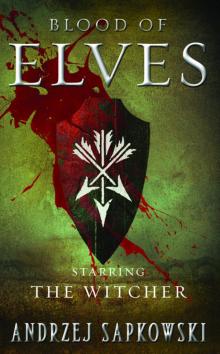 Blood of Elves
Blood of Elves Lastavičja Kula
Lastavičja Kula Gospodarica Jezera
Gospodarica Jezera Vatreno Krštenje
Vatreno Krštenje Sezona Oluja
Sezona Oluja Lady of the Lake
Lady of the Lake The Road With No Return
The Road With No Return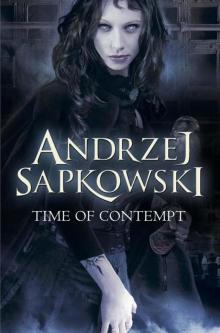 Time of Contempt
Time of Contempt Mač Sudbine
Mač Sudbine The Malady and Other Stories: An Andrzej Sapkowski Sampler
The Malady and Other Stories: An Andrzej Sapkowski Sampler The Saga of the Witcher
The Saga of the Witcher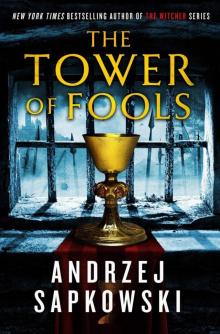 The Tower of Fools
The Tower of Fools Vreme Prezira
Vreme Prezira Introducing the Witcher
Introducing the Witcher Stephen Hulin
Stephen Hulin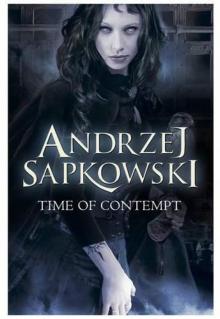 The Time of Contempt
The Time of Contempt The Sword of Destiny
The Sword of Destiny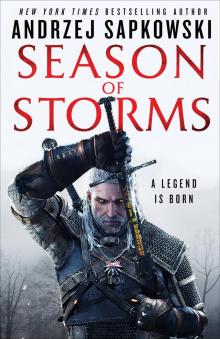 Season of Storms
Season of Storms The Tower of Swallows
The Tower of Swallows The Last Wish: Introducing The Witcher
The Last Wish: Introducing The Witcher The Lady of the Lake
The Lady of the Lake